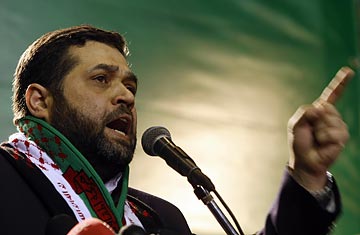
Hamas leader Osama Hamdan speaks during a rally in Beirut.
The idea that there can be no Israeli-Palestinian peace that bypasses Hamas has lately emerged as conventional wisdom among a broad range of Washington foreign policy experts — and it appears that the U.S. and some of its key European allies may be quietly in agreement. A senior Hamas official has told TIME that Western powers publicly committed to boycotting Hamas, which is officially designated a terrorist organization by the U.S. and European Union, have nonetheless initiated discreet contacts with his organization. Osama Hamdan, the organization's top leader in Lebanon, said in an interview in Beirut that Hamas had in recent weeks established "solid, direct contacts" with four European Union countries, and that there had been unofficial talks between Hamas and the team of President Barack Obama's Middle East special envoy, George Mitchell. Hamdan refused to elaborate.
"We are not aware of any contact between Hamas officials and staff of Senator Mitchell," Acting Assistant Secretary of State for Public Affairs Robert Wood said in response to a query from TIME on Hamdan's claim. And State Department spokesman Darby Holladay declined to comment on alleged contacts with Hamas, but stressed that the U.S. has not changed its policy of refusing to deal with the organization until it agrees to recognize Israel, renounce violence and endorse past Israeli-Palestinian agreements. (Hamas continues to refuse to make those concessions.) (See pictures of life under Hamas in Gaza)
Hamdan declined to identify the European countries with which he claimed Hamas has held talks, but said they were "significant" nations, and described the discussions as substantial. "I think there is a shift in [the Europeans'] position [on boycotting Hamas]," said Hamdan, who was recently elected to the organization's top political body. "It's not enough, but it's encouraging I think if that shift happens, this will help create stability and maybe peace in the region." Hamdan, a fluent English speaker, has met discreetly with a number of former U.S. and British officials in recent years.
The three preconditions for dealing with Hamas were imposed after the movement won the January 2006 Palestinian legislative elections. The boycott was reinforced by economic sanctions, and a full-blown siege of Gaza after Hamas fighters drove forces loyal to Palestinian Authority President Mahmoud Abbas out of the territory in July of 2007. But neither the economic siege nor Israel's three-week military campaign preceding President Obama's inauguration have managed to break the movement's grip. The new Administration assumed office with Hamas having affirmed its position as an intractable fact of Palestinian political life. And influential foreign policy voices have publicly urged President Obama to adopt a more flexible approach on Hamas than that of his predecessor. A few days before Obama's inauguration, nine elder statesmen, including some known to have previously counseled the President such as former National Security Adviser Brent Scowcroft and former Fed chairman Paul Volcker, wrote a letter urging the incoming President to explore talks with Hamas. President Obama has, indeed, reached out to Syria and Iran, the organization's key regional backers. And in Congressional testimony last month, Secretary of State Hillary Clinton indicated that the Administration would want to deliver aid to a Palestinian unity government that agreed to abide by the three conditions, even if it included Hamas ministers.
While U.S. officials insist their stance on Hamas has not changed, hawkish pro-Israel legislators in Washington are concerned over what they see as the Administration's eagerness to do business with elements officially designated as terrorists. The Administration's proposal is akin to agreeing to support a government that "only has a few Nazis in it," Rep. Mark Steven Kirk, an Illinois Republican, told Clinton at a House hearing last month.
Hamdan makes clear, however, that the only shift Hamas has so far seen from Washington is a "very, very slight" change in the language emanating from the White House, and no substantial change on the ground. Still, he boasted, "maybe Obama himself and the whole Administration know the facts and the reality of the Palestinian situation And one of those important facts is that [Mahmoud Abbas] is not in charge anymore If they need leaders, real leaders, they can talk to Hamas."
Hamas' diplomatic game may actually have been helped by the election in Israel of a government that has refused to explicitly back a two-state solution to the conflict. That has allowed Hamas to argue that Israel is the party not ready for peace, and that Abbas' recognition of Israel has not gained the Palestinians anything. And the organization has begun putting forward its own ideas about how to achieve peace: It wants Israel to withdraw its soldiers and settlers from all lands it occupied in the June 1967 war, and allow the return of all Palestinian refugee families to the towns and villages inside Israel from which they fled in 1948. Should Israel meet those conditions, Hamas would proclaim a 10-year truce during which an elected Palestinian government would decide on its future relationship with Israel. But Israel rejects any mass return of Palestinian refugees in exchange for a permanent peace, much less for a 10-year truce. And for now, Hamas has no plans to disarm. Buoyed by its survival of the Israeli onslaught in Gaza, it believes time is on its side and that it has less to lose than its adversary. Israel, says Hamdan, has "to know they can't fight forever."
—With reporting by Massimo Calabresi/Washington
